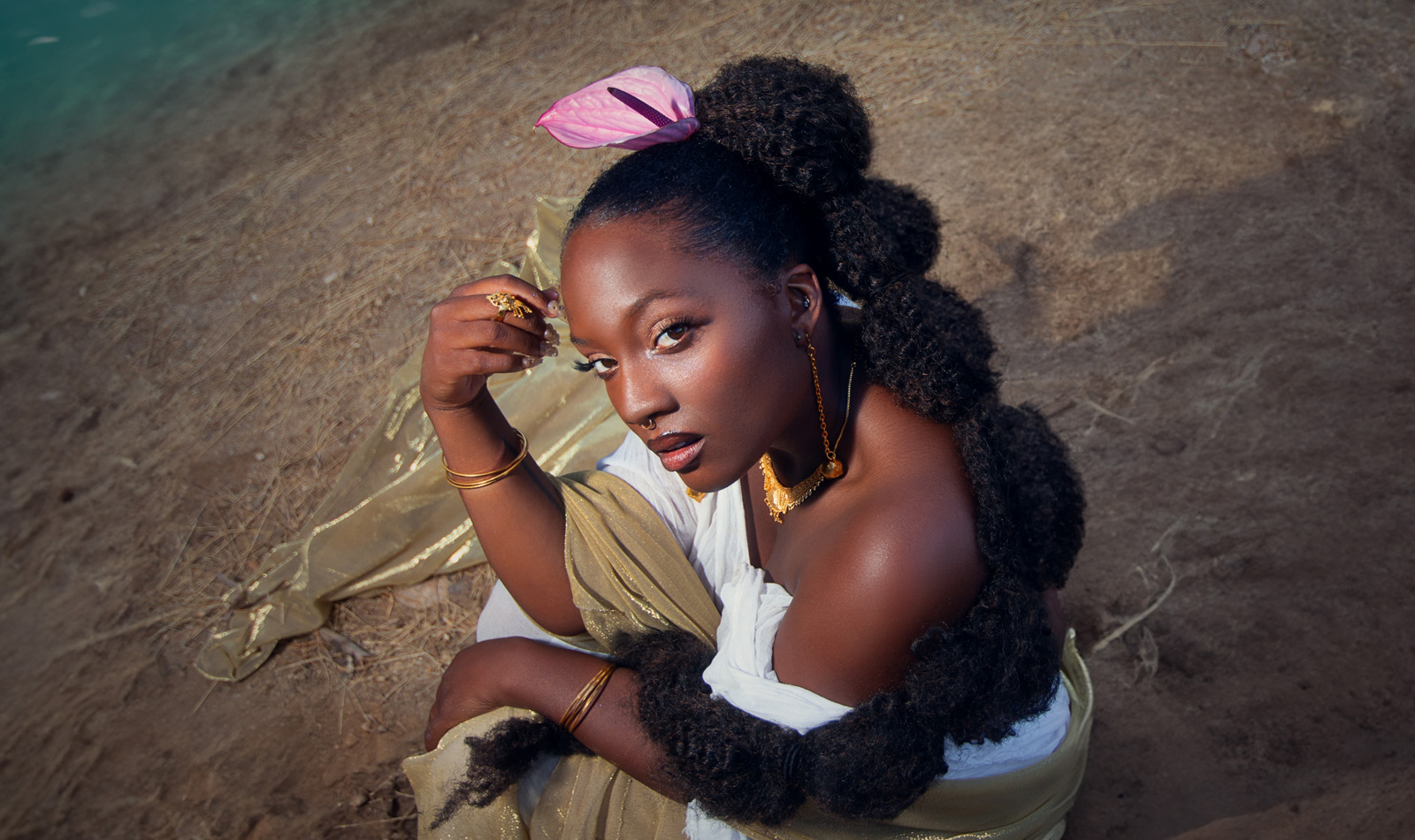
“I really wanted to access a darker world after coming from making music that was very light,” says LA-based harpist and singer-songwriter Nailah Hunter of her debut album, Lovegaze. “To explore the grit of my sound instead of the easy, shiny parts of it.”
To help unearth this grit, Hunter relocated to Portsmouth, a port city in the South of England. “It’s not necessarily rolling green hills,” says Hunter. She’s putting it mildly: the city is known to possess a certain edge and a bleakness of climate. “It’s very easy to imagine medieval wars and ancient human lore taking place in that area of the world,” Hunter says, “so it definitely proved a real source of inspiration.”
Prior to Lovegaze, Hunter was focused on making instrumental harp music that functioned, in her own words, as “a bright space for healing.” It was inspired by fantasy worlds and mysticism and was linked to Hunter’s childhood love of film scores and classical music. “All the fantasy, medieval, and renaissance stuff came from seeing that on TV as a child and hearing the music associated with it,” she says. “I was like, ‘Oh, that’s for me.’ That really activated me. Like the soundtrack for the BBC’s Chronicles of Narnia—I loved the sound and feeling of the Baroque stuff.”




Vinyl LP


On her debut album, Hunter opens things up both sonically and thematically. She utilizes her voice for the first time, with electronic beats and dreamy atmospherics merging with the delicate plucking of a Celtic harp she borrowed when in England. The opener “Strange Delights” is a woozy piece of electronic dream pop; “Finding Mirrors” sits halfway between incandescent synth-pop and trip-hop, while elsewhere, you’ll find touches of everything from ambient to sprinklings of experimental new age. While the music is conventionally beautiful, with compositions that are deft and delicate as well as bold and brooding, at its core, the album is rooted in turmoil. Or as Hunter describes it: “It’s about humanity’s propensity to destroy the things we love.”
While that theme can feel ominous, the music that springs from it remains hopeful and warm. Hunter’s harp is still present, but it’s stripped of the more soothing and tranquil sounds with which it is often associated. “I wouldn’t say it was an act of defiance,” Hunter says. “But I wanted to explore what arranging with harp could feel like, versus having harp be the meat of the thing. Harp always brings us the feeling of accessing something old, but the electronic elements have allowed me to find a way to curl the natural elements around the beats. A lot of it comes down to intention, too. If I pluck thinking of a ray of light versus plucking and thinking of clattered stone, that’s going to produce a different sound.”
Hunter’s musical background is varied. She studied music at The California Institute of the Arts and later became so taken with the harp that she’d lock herself away and play for six hours a day. The daughter of a pastor, Hunter’s musical education began in the church, where she played multiple instruments and sang in the choir. “I was singing and playing drums there, but it became this thing I kind of hated,” she recalls. “I was getting into my teenage years and was like, ‘Oh my God, I don’t want to go to church anymore, this is so annoying.’ I would be on stage and people would come up to my dad after and say that I was possessed because I looked so angry.”


Vinyl LP


That early experience was one of the reasons it took Hunter so long to finally incorporate her voice into her music. “Choir was an integral part of my life for a long time,” she says. “But I struggled with this idea of being taught a certain way—a way that falls in line with a Western way of making music and, therefore, may be attached to colonialism. So it became about, ‘How do I reclaim my personal voice while also using those same techniques that I have muscle memory of?’ That’s the journey that I’ve been on.”
Reconnecting with and reclaiming her voice became an emotional experience during the making of Lovegaze. “There were tears in the [vocal] booth,” she laughs. “Listening back to the album, there’s this feeling that I’m threatening to cry—or had just cried—in almost all of the vocal takes. I love that about it because it’s halfway true.” The tears were caused, she says, by “this feeling that we’re all hanging on by a thread right above this pit of despair that’s threatening to consume us at any time.”
That pit of despair is rooted in the past as well as the now, in societal and environmental collapse along with her own personal difficulties. “It’s about accessing whatever it is that makes humanity war with each other and destroy things,” she says. “Because that’s the thing that is constantly here with us on the planet, right? That spirit of darkness is with us, so why not face it instead of encasing ourselves in light to separate ourselves from it.”
The result is an album that is a leap in terms of tone, style, and ambition. “I couldn’t have stayed where I was,” Hunter says. “It would be stagnation to remain in a place that felt safe. It was important to explore a darker world, but there’s still an ethereal beauty to be found in the underworld.”







